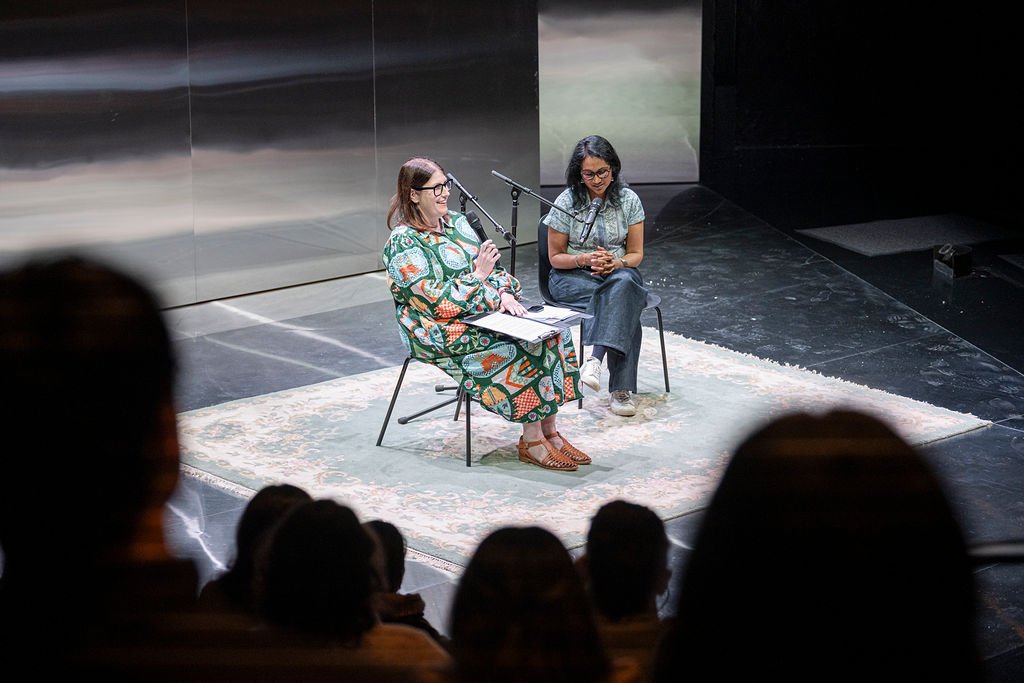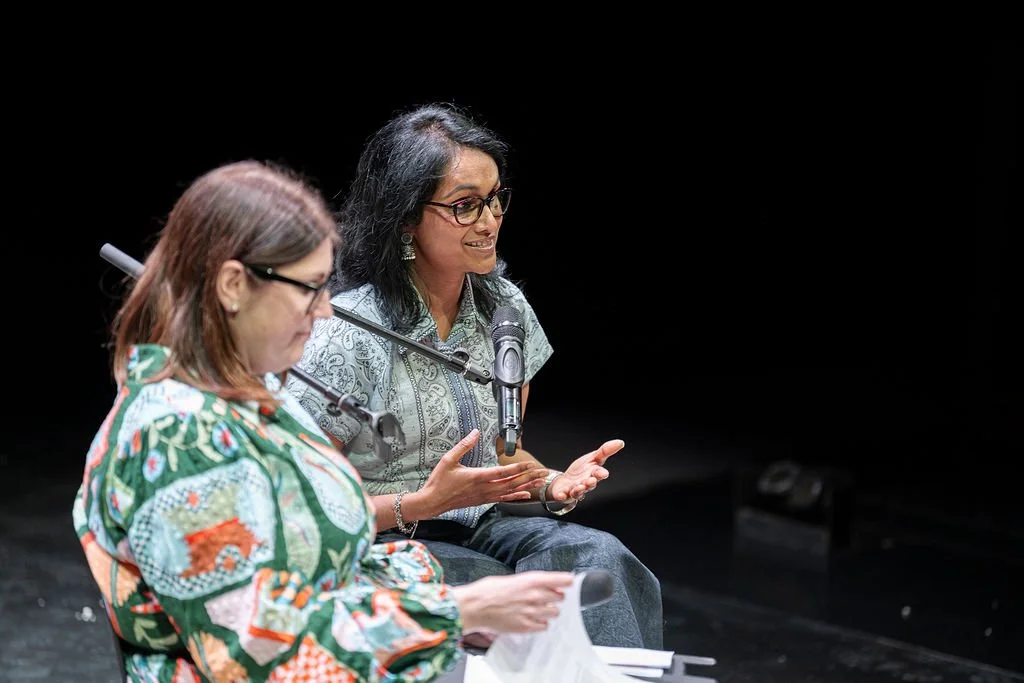In Conversation with Shankari Chandran
RACS Centre Director and Principal Solicitor Sarah Dale sat down with award-winning author Shankari Chandran at Belvoir St Theatre to discuss her writing, advocacy and the power of community when it comes to fighting for refugee rights.
Here is their conversation, edited for brevity and clarity.
Listen to the audio version here.
Sarah Dale: Shankari, as well as writing about dispossession and the creation of community and working in the social justice sector, you are a child of refugees. So, with all of this, there's quite a lot of alignment between you and RACS.
We are stoked to have you as our newest Neighborhood Ambassador and as someone who has contributed a range of perspectives to our narrative. Can you tell us about your connection with refugee rights in your life and in your writing?
Shankari Chandran: My connection to refugee rights is about really being acutely aware throughout my own life of the privilege that we had growing up in Australia, because our parents made choices that were closed off to the rest of our people, our ethnic group, the Sri Lankan Tamil people.
Because at a certain point in time, they had no choice but to stay, and then they had no choice but to survive, if they could, and eventually they had no choice but to flee.
My father, as a child, he tells stories of creating projectile weapons out of bottles of soda, filling them with sand and rocks, and discussions amongst his seven siblings of what would be the most effective way to protect themselves.
We then moved to this life in Australia that our family gave us, and we see the outbreak of war where in one week, 3,000 Sri Lankan Tamils were set on fire and killed, which precipitated a civil war that went for almost 30 years and culminated in almost 100,000 people dying.
So, we were always aware of the life that we could have had… and then the question became throughout out child,
"How will you use that privilege? How will you use the safety, the security, the education, the training that you have been given?"
SD: So much of your writing is clearly about tackling social issues, so much is a reflection of your history, of your family's experience, of the connection here in community. What then do you then see is the purpose of your writing?
SC: Completely honestly, it is initially a selfish pursuit because there is enormous joy for me in sitting down to play with words. It is both a hedonistic experience and a connection to self. We must strive for connection with ourselves.
Writing enables me to create connection with other people. I can feel a sense of being in a community and creating community through writing, through storytelling, through reading the work of other people.
My first five novels were very much motivated by rage. I wanted to know why it was considered acceptable for our people, for our children, for any people, for any children to be the victims of genocide. Why did the systems of justice fail our people? Why do they continue to fail our people? And so, I write in a way that hopefully, makes it real for people. And I hope that some of those people are people in power. I want to reveal these injustices that are so easily hidden.
SD: You often explore the theme of family, referencing things like passing down recipes or oral histories, to maintain cultural traditions.
SC: This for me is fascinating, because Australian policies and laws have a very restrictive definition of what family is.
The nuclear family isn't the norm everywhere. Indeed, my own family is not as cookie cutter as a stereotype would allow. But this becomes a real issue here when the refugees we are working with seek visas for their family members to reunite with them here in Australia and when their lives don't fit the mould.
What kind of concepts are we ignoring when we create these political boundaries around who we think it is appropriate to consider within our care and not within our care, within our unit and not within our unit.
If we are to actually continue as a species, what we owe to each other is not just because "I know you", because you're related to me, it's because "you are human".
SD: There is a real focus on community building and resistance in your book Safe Haven, represented by the fictional rural town of Hastings. RACS is very familiar with the unique challenges of accessing support services in rural Australia. And we are very, very grateful to the very many supports we receive from non-city centric groups like Rural Australians for Refugees and the Blue Mountains Refugee Support Group.
What was your inspiration for Hastings? Did you spend much time in rural Australia or with any communities of resistance before writing this book?
SC: I went to places like Dubbo and Apollo Bay, to sit in the dirt so to speak, and have conversations with people and understand the challenges of rural Australia but also be humbled and inspired by the communities.
I wanted to write a novel of enormous community activism, of adopting people into the community and making space for them and supporting them. Rural communities come together because they have no one else. Hastings is a reflection of all of that.
A really important thing for me in the writing of Safe Haven was not just to lose myself and therefore lose the reader in the inhumanity of indefinite detention and the system that allows that, but to really elevate the communities that fight that.
SD: You mentioned that you write from a place of anger and unrest, about the injustices to be solved. What you found in writing that you perhaps didn’t find in your past legal work when it comes to this?
SC: I do miss being a lawyer… but I did find myself deeply disillusioned in 2009 when, as the final genocide was happening in Sri Lanka, Sri Lanka’s own laws could and would do nothing about it. More broadly though,
I have found it deeply, viscerally disillusioning that the framework of international humanitarian laws that were meant to protect noncombatants - that were meant to protect everyday people - failed them
and that there were no systems of power and no people in power that were willing to exercise those rights and those protections in the way that they were intended to be exercised.
So I thought, well, if the law has failed, I’ve still got words. There’s power in words and I’m going to fight.
SD: And your message still absolutely needs to be heard loud and clear and on repeat. One final question: do you think your book Chai Time at Cinnamon Gardens is still relevant in today’s rise in anti-immigration rhetoric, or do you think there’s something unique about the current time and place that requires another book?
SC: Much is happening in Australia and elsewhere around the world. And for myself, I want to better understand the anger, the frustration. The Disenfranchisement and disempowerment that people feel to such an extent that they would take to the streets in the way. I want to have that conversation not from a safe distance or on the internet, but in a manner that is respectful and, God forbid, even loving.
When you ask me, if Chai Time still has its time and place - I think, unfortunately, all literature still has its time and place. You could read The Handmaid's Tale, you could read 1984, you could read any novel in a library. And they would still be of enormous value and relevance today.
And that is so unfortunate. And that is such a deep indictment of our inability to learn, to hold dialectical thought, to hold multiple ways of thinking and being.
I will not be writing a sequel, but
I will continue to write because there’s more work to be done and there are better worlds to build.
Want to listen to the whole conversation? You can find the audio recording here.


